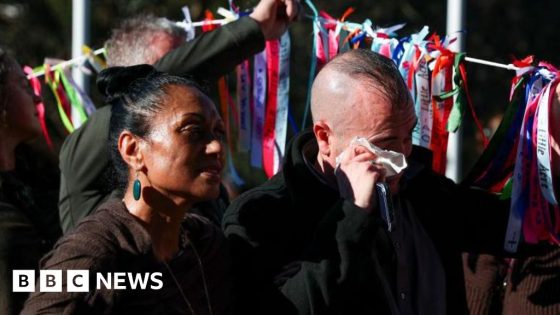Some 200,000 children, young people and vulnerable adults suffered abuse while in state and faith-based care in New Zealand over the last 70 years, a landmark investigation has found.
It means almost one in three children in care from 1950 to 2019 suffered some form of abuse, including being subject to rape, electric shocks and forced labour, according to the Abuse in Care Royal Commission of Inquiry.
The publication of the commission’s final report follows a six-year investigation into the experiences of nearly 3,000 people.
It is New Zealand’s biggest and most expensive inquiry to date, costing around NZ$170m ($101m; £78m).
Many of these people have come from disadvantaged or marginalised communities, including Māori and Pacific people, as well as those with disabilities.
More than 2,300 survivors spoke to the inquiry, which found that in most cases, “abuses and neglect almost always started from the first day”.
The report found that Māori and Pacific survivors endured higher levels of physical abuse, and were often “degraded because of their ethnicity and skin colour”.
It also found that children and people in foster care experienced the highest levels of sexual abuse among various social welfare care settings.
“It is a national disgrace that hundreds of thousands of children, young people and adults were abused and neglected in the care of the state and faith-based institutions,” the report said.
“Many survivors died while they were in care or by suicide following care. For others, the impacts of abuse are ongoing and compounding, making everyday activities and choices challenging,” it added.
The country’s Prime Minister Christopher Luxon called it a “dark and sorrowful day in New Zealand’s history as a society”, saying “we should have done better, and I am determined we will do so”.
He added that it was too soon to reveal how much the government expected to pay victims in compensation.
Mr Luxon said he would offer a formal apology on 12 November.
According to the report, the economic costs of this abuse and neglect has been estimated to be anywhere from NZ$96bn ($56.9bn; £44.16bn) to $217bn, taking into consideration negative outcomes including increased mental and physical healthcare costs, homelessness and crime.
On Wednesday, dozens of care abuse survivors took part in a march to parliament before the inquiry was released.
One survivor called the report “historic”.
“For decades they told us we made it up,” Toni Jarvis told news agency Reuters. “So this today is historic and it’s an acknowledgement. It acknowledges all the survivors that have been courageous enough to share their stories.”
Academic Dr Rawiri Waretini-Karena, who was a witness in the inquiry, had earlier spoke about the “pipeline from state care to prison”.
“When I walked into the prison yard for the first time as a teenager, having never been there before – I already knew 80% of the men in there. We’d spent the last 11 years growing up together in state care,” he wrote in an opinion piece for Radio New Zealand.
“That’s when I knew there was a pipeline to prison; a pipeline that has spent decades sweeping up and funnelling Māori children from state care to prison.”
Dr Waretini-Karena added that the Royal Commission’s report acknowledged “that whilst we are responsible for our actions, we are not responsible for the hidden mechanisms that operate within the environment we are born into, privileging one faction at the expense of the other”.
Source Agencies



